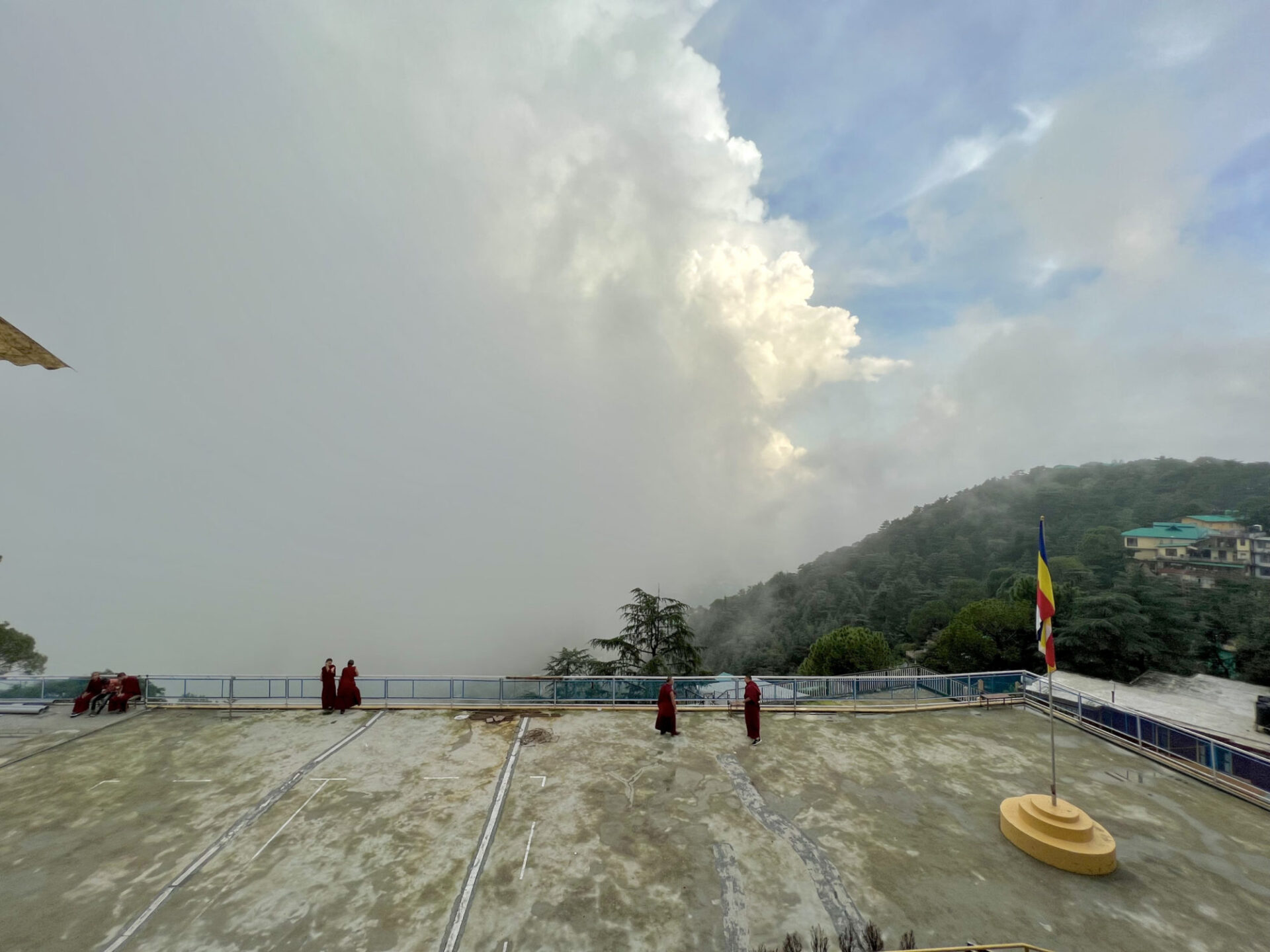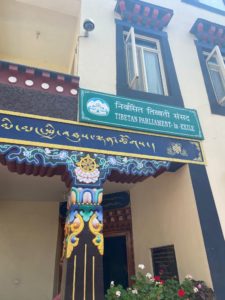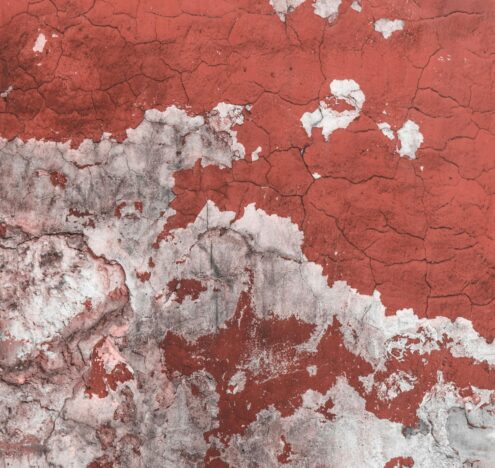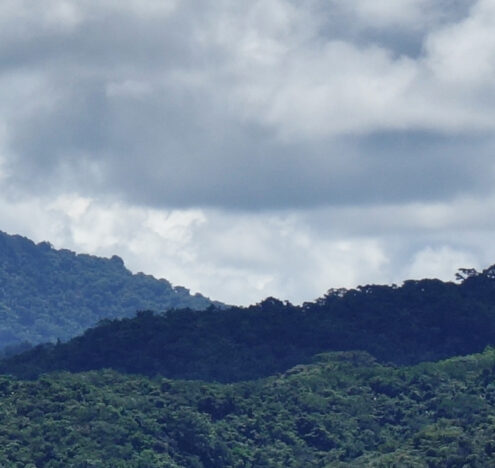Dharamsala, India is perhaps best known as the residence of His Holiness the 14th Dalai Lama. But it is also home to an entire community-in-exile, consisting of thousands of members of the Tibetan diaspora. These individuals are collectively working for a political cause while also facing constant security challenges from the Chinese Communist Party, which include being unable to speak to family back in Tibet for years on end, being intimidated by Chinese Communist Party officials directly, and having their electronic devices hacked and monitored — just to name a few.
Tibetans in Dharamsala are not a monolith. Various groups and figures have different ideas of what they consider the best way forward to advance their movement. At the same time, there is a sense of unity among people, since the community is pursuing the same goal of defending Tibetan rights and culture. Tibetans are trying to navigate this internal debate, while also combating consistent external threats simultaneously.
A HISTORY OF STRUGGLE
Tibetans have been engaged in a constant struggle since 1950-1951, when the Chinese Communist Party invaded and annexed Tibet. Tibetans responded with the subsequent 1959 rebellion against Chinese occupation, which remains ongoing to this day. It was then that the Dalai Lama fled to India, ultimately settling in Dharamsala. Many today cite the 2008 uprising in Tibet as a key moment in recent history after which China began amplifying its crackdown on institutions, schools, and monasteries that promoted Tibetan religion or culture around the world, including those funded by foreign states. Beijing also targets intellectual and religious leaders within the community, even indoctrinating young monks loyal to the Chinese Communist Party to propagate “Tibetan Buddhism with Chinese characteristics.” These endeavors are all part of China’s preparation strategy to select the next Dalai Lama — one of its top priorities.
The Chinese Communist Party’s aim is to create an iron curtain between those within and outside of Tibet. Several steps are taken to achieve this, including confiscating the passports of Tibetans in Tibet as well as across China. Tibetans who choose to visit Tibet are only allowed entry with a special permit and must register themselves in Lhasa with the authorities who then track their movement. The two primary Chinese Communist Party organs responsible for carrying out such activities are the Ministry of State Security and the United Front Work Department, who say they will “assist” members of the Tibetan diaspora in visiting Tibet; if they refuse, these entities begin to pressure and threaten their family members inside Tibet as a tactic of intimidation. China is seeking to gain oversight and control of the Tibetan diaspora as much as possible — and using their relatives as leverage in order to do so.
The Chinese Communist Party regularly infiltrates the Tibetan community abroad, including in Dharamsala. This can take the form of spreading disinformation as well as recruiting informants. There are attempts to sow division between different sects of Tibetan Buddhism on digital platforms popular amongst the community, like Facebook and Telegram. Tibetans also receive phishing emails, for example, disguised as invitations to events with His Holiness. Fake Chinese Communist Party social media accounts follow pages supporting the Dalai Lama to make themselves appear legitimate to unsuspecting users.
I was told one anecdote in which a person contacted a member of the Tibetan government-in-exile, claiming to be from Hong Kong and trying to extract information about the Tibetan community in Dharamsala. Notably, this exchange was conducted in English. Chinese Communist Party officials sometimes openly approach and intimidate Tibetan leaders in the city as well. They also use monetary incentives and threaten people’s connections in Tibet to recruit Tibetans to act as spies within their own community. Tibetan leaders in Dharamsala are reminding those around them to refuse such demands. The array of methods the Chinese Communist Party is employing reveals the fact that Beijing is using all avenues at its disposal, in both subtle and overt manners, simply because Tibet is of such importance to China — making it all the more frustrating that the issue receives so little attention in Western and international discourse.
“THE MIDDLE WAY” AND ITS DISCONTENTS
While in Dharamsala, I met and spoke with Serta Tsultrim, a Tibetan MP who advocates for a completely free Tibet. Tsultrim attributed his repeated electoral wins since 2006 to this stance, which is distinct from the “Middle Way” approach officially promoted by the Dalai Lama and the Central Tibetan Administration. Twenty out of 45 MPs in the government-in-exile are proponents of total independence, according to Tsultrim.
Tsultrim is the founder of Tibet Express, a weekly newspaper that shares information and editorials relevant to the Tibetan community. Projects like this and other forms of Tibetan resistance in India are dangerous for those still inside Tibet, he told me. People in Tibet are compelled to submit personal documents in order to obtain SIM cards, a flagrant display of the extreme level of monitoring Tibetans face under the Chinese Communist Party’s watchful eye. For this reason, many Tibetan activists abroad do not contact their family in Tibet in order to protect them. In 2016, Tsultrim’s brother was imprisoned in Tibet for unexplained reasons. Tsultrim said he had never spoken about the situation before to anyone in the media, but he suspects his sibling’s fate could be punishment for his own political involvement.
Students for a Free Tibet is a grassroots initiative that was founded in 1994, following the Dalai Lama’s reception of the Nobel Peace Prize in 1989, when youth were inspired to take action. Students for a Free Tibet consists of both Tibetan and non-Tibetan activists, and its India chapter was created in 2000 to focus on Tibetans within India, especially the younger generation. Students for a Free Tibet engages in campaigns to free political prisoners as well as climate and environmental justice, hoping to garner more international attention for their cause. They hold action camps for training on strategic non-violence and, as their name suggests, believe in total independence for Tibet.
I met with Students for a Free Tibet India’s national director Rinzin Choedon and two of her colleagues, who spoke of February 13 as an unofficial independence day to psychologically motivate the community. They shared that they’ve grown familiar with receiving regular threats and being unable to communicate with family members inside Tibet. They voiced their concern at what they term the “ongoing cultural genocide” occurring in Tibet, which included the forced sterilization of Tibetan women in the late 1980s and 1990s. China is also continuing to move Han Chinese immigrants into Tibet, claiming Tibet is now around 10 percent Han — but the individuals I met in Dharamsala put that figure at closer to 30 or 40%. The Chinese Communist Party-funded Confucius Institute offers foreigners scholarships to research and tour Tibet — under Beijing’s terms, of course. It is extremely difficult to gain access to and visit the region in an unfiltered and uncurated manner.
Those I sat down with at Students for a Free Tibet raised their discomfort with how the West exoticizes Tibetans as a one-dimensionally pacifist people. They pointed to the existence of a tactical operations unit known as the Special Frontier Force and the involvement of Tibetan soldiers in Bangladesh’s war of independence and the Kargil conflict between India and Pakistan. Of course, this is not to say anyone is promoting violence, they explain, but rather, the idea that Tibetans cannot or will not stand up for themselves must be dismantled. The issues at hand — and the people involved — need to be treated with the complexity and nuance they deserve.
The Tibetan Youth Congress is labeled as a terrorist organization by China. The Chinese Communist Party has been trying to pressure India to shut the group down and stifle its activity. The Tibetan Youth Congress was established in 1970 and has over 88 chapters globally. Its objectives are to work under the Dalai Lama, to work to unite the Tibetan people, and to preserve Tibetan culture and identity. The Tibetan Youth Congress is the largest nongovernmental organization that wants independence for Tibet, which is distinct from the Middle Way policy advocated by the Central Tibetan Administration and the Dalai Lama. In fact, China often uses this discrepancy to drive a wedge between the two, conducting disinformation campaigns that paint the Tibetan Youth Congress as being in conflict with the spiritual leader.
Tibetan Youth Congress president Gonpo Dhundup said the organization’s members are questioned when they visit Tibet, and some, like Tibetan Youth Congress’ own general secretary, have refrained from contacting their family for several years for their own safety and that of their relatives. Dhundup said that he himself has been targeted as the Chinese Communist Party acquires phone numbers of activists residing in Dharamsala, confronting and threatening them directly. He framed a free Tibet as positive for India’s security interests, saying it could act as a buffer zone between the world’s two most populous nations. Like Students for a Free Tibet, Tibetan Youth Congress’ president also mentioned the ecological point of view, explaining that the Chinese Communist Party is diverting Tibet’s water to the rest of China, which, coupled with climate change, could lead to natural disasters. As Students for a Free Tibet mentioned, Tibet’s land also contains lithium deposits, and China has strategically demarcated territory to take advantage of this valuable natural resource — at the expense of local Tibetans.
Dhundup said that he understands and respects that all nations have their own interests, but that democracies have a moral duty to safeguard oppressed nations — and that he hopes the West will recognize the Tibetan government-in-exile and accept the reincarnation of the Dalai Lama chosen by the Tibetans.
COUNTERING CHINESE PROPAGANDA
The mission of the Tibet Policy Institute is to present research to the international community in an effort to counter Chinese propaganda about Tibet. However, the current issue is that Beijing cares less and less about global pressure than ever before. The center focuses on Tibet’s historical status and independence, as well as China’s Tibet policy and the Sinicization of Tibetan Buddhism.
One of the most significant and disturbing pieces of information I learned in Dharamsala was from Tibet Policy Institute’s director, Dawa Tsering, regarding recent reports out of Tibet about so-called “night stay schools” (translated from Mandarin). Tibetan students are allegedly being forced by government order to attend institutions where they are taught only in Mandarin and prohibited from seeing their parents. Previously, authorities detained parents who refused to send their children to these schools, a consequence many were willing to bear, but are now threatening to detain the children instead in order to force parents to comply. This phenomenon sounded to me like a carbon copy of Canada’s residential schools, which were used to carry out cultural genocide against indigenous communities in North America.
I made a point to ask everyone I met in future meetings about this development. Tibetan Youth Congress’ president stated that the “colonial boarding school policy” would be a core issue for the organization’s upcoming lobby work. Students for a Free Tibet members also told me that this was something they were concerned about, having heard reports that children are being forced into these schools at a very young age and that teachers in such institutions are fired for accidentally speaking Tibetan. They also noted that although the reports came out within the last year, the reality is that this has likely been going on far longer, because information out of Tibet moves slowly due to censorship. The Chinese Communist Party’s ability to hide the ongoing cultural genocide in Tibet is frightening — but even more so is the world’s willingness to cover its eyes and ears in response to the information that does trickle out.

During my meeting with Students for a Free Tibet, a torrential downpour had begun outside, so loud that it was hard to hear our own conversation. At the exact moment the discussion was concluding and we were preparing to say our goodbyes, we all noticed a perfectly full rainbow had formed. “That must be a sign of hope,” Students for a Free Tibet’s national director said, “for Tibet.”
Victoria Jones is a Senior Research Fellow at the Asia-Pacific Foundation, an international policy assessment group based in London. Additionally, she is the chief editor of INTERZINE, a digital media platform that uses history to contextualize current global issues.






















